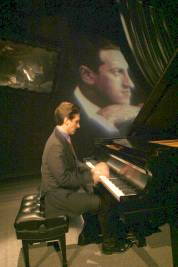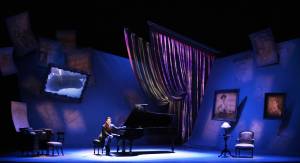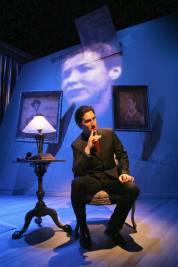
Every so often, a performer creates a theater genre or role which pretty much guarantees him or herself a potentially endless future on stage. Jaston Williams and Joe Sears have done so with their Greater Tuna roles. Marypat Donovan has too with her Late Nite Catechism series. Add to that list Hershey Felder.
With his “Composer Sonata” (Hershey Felder As George Gershwin Alone, Hershey Felder As Monsieur Chopin, and Hershey Felder Beethoven As I Knew Him), Felder has given literally thousands of performances to cheering audiences around the world. The 2007 Geffen Playhouse run of Hershey Felder As George Gershwin Alone won Felder the Ovation Award for Best Actor In A Musical, quite a feat for an actor who is not a “musical theater performer” and a show which is, technically speaking, not a musical.
Felder’s latest stop is the Laguna Playhouse, where Felder is performing the first (and best) of the trilogy, disappearing into the skin of American music legend George Gershwin, who managed during his brief thirty-eight years to create some of the most memorable musical compositions of the 20th Century, from pop songs like “Someone To Watch Over Me,” “They All Laughed,” “But Not For Me,” “I Got Rhythm,” and oh so many others written for the Broadway stage, to his “folk opera” Porgy And Bess, to his classical compositions, most notably “Rhapsody In Blue” and “An American In Paris.”
Hershey Felder As George Gershwin Alone is divided into two segments, both of them enthralling. In the longer first segment, Felder appears as Gershwin himself, recounting biographical anecdotes interspersed with superbly performed piano solos, or vocal performances with piano accompaniment. In the delightful “encore,” it’s Hershey Felder as Hershey Felder in a Q & A with the audience about Gershwin’s life and music, featuring impromptu audience participation which makes every performance unique.
As Gershwin, Felder gets laughs recalling how his Russian Jewish immigrant father misheard “Fascinating Rhythm” as “Fashion On The River.” He imitates both Al Jolson and Ethel Merman, coming to the conclusion that they had exactly the same voice. He discloses having added high notes to “I Got Rhythm” just to give Merman something to sing way up to the rafters. He talks about how movie mogul Samuel Goldwyn told Gershwin he’d never amount to anything as a composer because nobody could whistle along to his melodies. On a more disturbing note, he reads car magnate Henry Ford’s racist, anti-Semitic rant on the African and Jewish influences in contemporary American music.
Hershey Felder As George Gershwin Alone is a “how he did it” primer in what made Gershwin great, the performer revealing the composer’s creative process, his sources of inspiration, and the way he went about composing his tunes. For example, in the song “Swanee,” Gershwin tells us, “I did one thing that nobody else would have. I changed the key in the middle of the song.” (And Felder shows us just how and when the change takes place.)
Since the production had to be approved by the organization known as “The Gershwin Family,” don’t expect to hear anything scandalous about the composer’s personal life. We do get some mention of brother Ira and of Kay Swift, with whom Gershwin had a ten-year affair, but nothing The National Enquirer would care to publish.
Since few if any in the audience know Gershwin’s actual voice, we have to take it on faith that we’re hearing “I’ve Got Rhythm”, “Embraceable You,” and “But Not For Me” sung the way Gershwin himself would have sung them, but they sounded fine to this reviewer’s ear. As for Felder’s piano artistry, he is more than up to the task of performing excerpts from “An American In Paris” or the complete “Rhapsody In Blue” to audience cheers.
When those cheers die down, Hershey Felder As George Gershwin Alone turns into a sing-along, Felder invariably persuading a volunteer or two to solo. (On opening night, it was “Someone To Watch Over Me” that got sung by actress/singer Stasha Surdyke and an accountant named Mike—both of them doing bang-up jobs on a moment’s notice.) Audience members then shout out favorite Gershwin tunes (and perhaps a couple not written by Gershwin), and Felder then prompts them the lyrics for an enthusiastic sing-along. Invariably, the group sing concludes with arguably the most beautiful of Gershwin’s Greatest Hits, “Summertime.”
TV, film and theater director Joel Zwick has shaped all three Hershey Felder shows to perfection, with a fourth (Hershey Felder as Leonard Bernstein) on the way next season. Yael Pardess’s set design, Richard Norwood’s lighting, John Boesche’s projections, and Jon Gottlieb’s sound design are all exquisite.
Following its six-week run, Hershey Felder As George Gershwin Alone is to be followed by two weeks of Hershey Felder As Monsieur Chopin. Audiences who see both with be astounded by Felder’s versatility. Hershey Felder As George Gershwin Alone is mesmerizing theater—and one thing is for sure. Anyone who sees it will never be able to hear the F-G opening of “Summertime” without thinking about Steven Spielberg’s Jaws. Don’t get the connection? See Hershey Felder As George Gershwin Alone and you will!
The Laguna Playhouse, 606 Laguna Canyon Road, Laguna Beach.
www.LagunaPlayhouse.com
–Steven Stanley
January 16, 2010





 Since 2007, Steven Stanley's StageSceneLA.com has spotlighted the best in Southern California theater via reviews, interviews, and its annual StageSceneLA Scenies.
Since 2007, Steven Stanley's StageSceneLA.com has spotlighted the best in Southern California theater via reviews, interviews, and its annual StageSceneLA Scenies.







 COPYRIGHT 2024 STEVEN STANLEY :: DESIGN BY
COPYRIGHT 2024 STEVEN STANLEY :: DESIGN BY